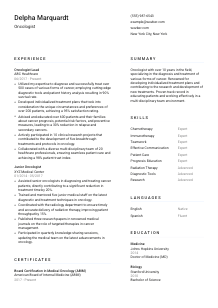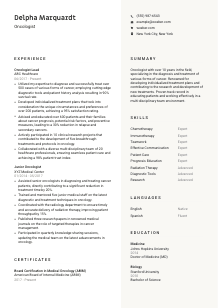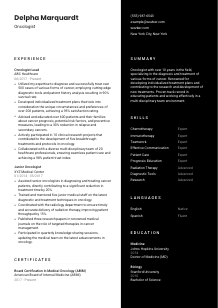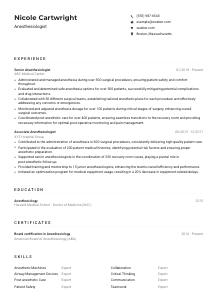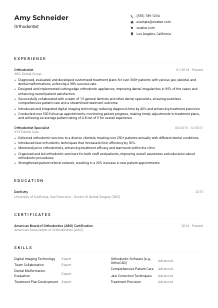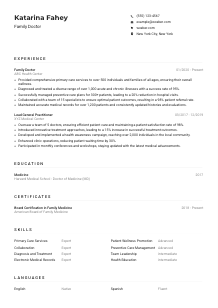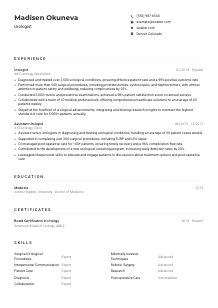Oncologist Resume Example
Fighting cancer, but your resume feels terminal? Explore this Oncologist resume example, cured with Wozber free resume builder. Discover how adeptly you can align your life-saving skills with job aspirations, ensuring your career prognosis shines as brightly as the patients you treat!
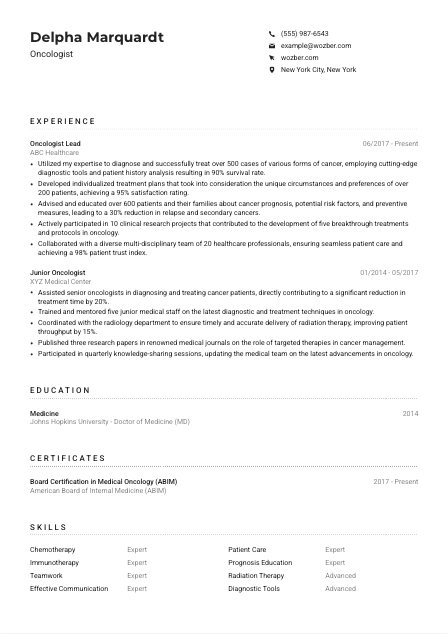
How to write an Oncologist Resume?
Hello, future star in Oncology! Crafting an eye-catching resume in the competitive medical field is akin to preparing for a complex surgery - it entails precision, understanding, and a touch of artistry. Your resume is more than a document; it's a testament to your dedication, skills, and the lives you've impacted. With the help of Wozber, a free resume builder, we'll guide you through creating a resume tailored to the Oncologist position you desire.
This guide is sprinkled with profession-specific tips and insights, ensuring your resume not only passes ATS optimization but truly represents your professional journey. Let's sculpt a resume that opens doors to your next career milestone!
Personal Details
The Personal Details section is your opening act, setting the stage for the narrative of your professional journey. Here's how to make it resonate with the depth and precision of an Oncologist's profile.
1. Your Professional Identity
Begin with your name, crisp and clear, possibly in a slightly larger font to stand out. This isn't just a name; it represents your professional identity in the realm of Oncology.
2. Job Title Alignment
Below your name, align your current or aspiring title with the position you're applying for - in this case, "Oncologist." It immediately connects your profile with the job, signaling a perfect match to the hiring manager.
3. The Right Contact Information
"Phone Number: Ensure it's your most accessible number and error-free. Professional Email Address: Opt for a straightforward format like firstname.lastname@email.com, reflecting professionalism and attention to detail.
4. Geographical Compatibility
Location is more crucial than one might think. Indicating "New York City, New York", as in our example, matches the job's location requirement, simplifying the hiring process by eliminating potential concerns about relocation.
5. Professional Digital Presence
In today's digital age, a LinkedIn profile or a personal website showcasing your professional achievements, publications, and contributions to the oncology community can be a powerful tool. Ensure it's updated and mirrors your resume to maintain consistency.
Takeaway
Your Personal Details section is more than factual information. It's an introduction to your professional persona, crafted with as much care as your clinical decisions. Reflect professionalism, attention to detail, and readiness for the role right from the start.





Experience
The Experience section is the heart of your resume, providing a window into your professional journey. For an Oncologist, this means showcasing your expertise in diagnosing and treating cancer, your collaborative approach in a multidisciplinary team, and your contributions to medical research. Let's ensure it effectively communicates your value.
- Utilized my expertise to diagnose and successfully treat over 500 cases of various forms of cancer, employing cutting‑edge diagnostic tools and patient history analysis resulting in 90% survival rate.
- Developed individualized treatment plans that took into consideration the unique circumstances and preferences of over 200 patients, achieving a 95% satisfaction rating.
- Advised and educated over 600 patients and their families about cancer prognosis, potential risk factors, and preventive measures, leading to a 30% reduction in relapse and secondary cancers.
- Actively participated in 10 clinical research projects that contributed to the development of five breakthrough treatments and protocols in oncology.
- Collaborated with a diverse multi‑disciplinary team of 20 healthcare professionals, ensuring seamless patient care and achieving a 98% patient trust index.
- Assisted senior oncologists in diagnosing and treating cancer patients, directly contributing to a significant reduction in treatment time by 20%.
- Trained and mentored five junior medical staff on the latest diagnostic and treatment techniques in oncology.
- Coordinated with the radiology department to ensure timely and accurate delivery of radiation therapy, improving patient throughput by 15%.
- Published three research papers in renowned medical journals on the role of targeted therapies in cancer management.
- Participated in quarterly knowledge‑sharing sessions, updating the medical team on the latest advancements in oncology.
1. Decode the Job Description
Assess each requirement thoughtfully, highlighting experiences that reflect your proficiency in chemotherapy, immunotherapy, radiation therapy, and your role in multidisciplinary teams.
2. Employment Synopsis
Chronicle your roles in reverse chronological order. For each position, include your title, employer, and the dates of employment, providing a clear, navigable journey through your career.
3. Achievement-Oriented Statements
Detail accomplishments that resonate with the job. For instance, "Diagnosed and treated over 500 cases of various cancer forms, employing cutting-edge diagnostic tools and patient history analysis." This demonstrates depth of experience and impact.
4. Quantify Success
Numbers speak volumes. Whenever possible, quantify your achievements - be it through patient survival rates, patient satisfaction ratings, or the number of clinical trials participated in.
5. Relevancy Is Key
Focus on experiences that sing to the role you're aiming for. Remember, being concise and targeted beats exhaustive and broad. A well-curated experience section holds power.
Takeaway
Turn your Experience section into a narrative of growth, expertise, and impact. Each point is your chance to shine. Ensure it clearly communicates why you're not just a candidate but the candidate for the role. Articulate, quantify, and tailor your journey for the Oncologist position you desire.
Education
In the high-stakes field of Oncology, your educational background provides the foundation of your expertise. It's crucial to articulate this section with grace, precision, and relevance to the requirements of the job you're after. Here's how to polish this cornerstone of your resume.
1. Key Requirements Highlight
The job description asks for a "Doctor of Medicine (MD) or Doctor of Osteopathic Medicine (DO) degree from an accredited medical school." Ensure this is prominent in your education section, precisely matching the listed requirements.
2. Simplified Structure
Structure this section for ease of reading: Degree first, followed by field, university, and graduation year. Clarity will ensure the hiring manager can swiftly ascertain your qualifications.
3. Reflect the Required Degrees
For an oncologist role, detailing your Doctor of Medicine (MD) and, if applicable, any relevant specializations or fellowships that align with oncology is essential, mirroring the level and focus of expertise sought in the job posting.
4. Relevant Courses and Achievements
Where relevant, list courses, research, or projects that spotlight your oncology-focused training. However, prioritize the content based on the role's seniority; for seasoned positions, extensive educational detail may be less pivotal.
5. Educational Acclamations
Accomplishments like honors or awards during your medical schooling that underscore your commitment and skill in the field can be noteworthy, especially if they are linked to oncology or patient care.
Takeaway
Your education is a testament to your dedication to Oncology. Craft this section to reflect not just the knowledge you've acquired but the journey that has shaped you into a capable and compassionate Oncologist. Let it lay the groundwork of credibility and expertise.
Certificates
Certificate section on your resume is akin to showcasing your badges of honor. It highlights continuous growth and specialized competencies. For an Oncologist, it's crucial to include certifications underscoring your expertise in Oncology practice and patient care. Let's navigate this section with precision.
1. Recount the Essentials
From the job requirements, "Board certification in Medical Oncology from the American Board of Internal Medicine (ABIM)" is a must-have. Ensuring your resume reflects this certification prominently can make or break your application.
2. Selection of Pertinent Certificates
Focus on certificates that underscore your proficiency and commitment to Oncology. Additional certifications like Advanced Life Support (ALS) highlight your readiness to respond to critical situations, adding depth to your profile.
3. Dating Your Certifications
For certificates with a validity period, ensure to include their acquisition or renewal dates. This transparency underscores your commitment to keeping your skills and knowledge up to date.
4. Continuous Professional Development
The medical field is ever-evolving, and so is Oncology. Exhibit a commitment to your growth and adaptability in the field by seeking out and listing the latest certifications relevant to your profession.
Takeaway
Let your Certificates section serve as proof of your unwavering dedication to excellence in Oncology. Each certification narrates your journey of growth and expertise. Keep it updated and aligned with the role you aspire to; it's your silent advocate.
Skills
The Skills section is where you shine a spotlight on your professional toolkit. For an Oncologist, this isn't just about medical proficiency but also about soft skills that enable effective patient care and team collaboration. Let's tailor this section to reflect the unique blend that defines you.
1. Extract Key Skills
From the job description, prioritize skills like chemotherapy, immunotherapy, radiation therapy, effective communication, and teamwork. These are your core competencies; make them prominent.
2. Match and Showcase
Correlate your skills with those listed in the job posting. For instance, if "effective communication" is a key requirement, rate yourself honestly and perhaps share a brief example in the cover letter or interview.
3. Organized Display
Create a clean, priority-based list - starting with the most relevant hard skills followed by soft skills. This order ensures that your most pertinent credentials catch the eye instantly.
Takeaway
The Skills section is your professional essence, distilled into a list. Curate it thoughtfully, aligning with the oncologist role you're targeting. These skills aren't just list items; they're the pillars on which your professional persona stands. Highlight them with the respect they deserve.
Languages
In a role that demands precision in communication, especially when discussing sensitive topics like cancer diagnosis and treatment, language skills can significantly enhance your profile. Here's how to present your linguistic capabilities in a way that complements your professionalism as an Oncologist.
1. Understand the Necessity
Given that "Must be skilled in English for business communication" was a requirement, mark your proficiency in English clearly. It's fundamental to patient care and interdisciplinary communication.
2. Prioritize Relevant Languages
Place the languages in order of relevance to the position. If your role involves serving diverse communities, indicating fluency in languages other than English, like Spanish in our example, can be a significant advantage.
3. Honest Proficiency
Be truthful about your level of language proficiency. Misrepresentation could lead to misunderstandings in sensitive medical contexts. Use terms like "native," "fluent," "intermediate," or "basic" for clarity.
4. Additional Linguistic Skills
If you possess language skills not directly mentioned in the job posting but relevant to the communities you'll serve, include them. They underscore your capability to provide empathetic and comprehensive care.
5. Role and Locale Compatibility
Link your language skills to the role's requirements and the location's demographic needs. This demonstrates not just your medical expertise but also your readiness to effectively communicate with patients and teams alike.
Takeaway
Language skills on your resume are like additional tools in your medical toolkit, ready to bridge communication gaps and foster understanding. Present them as not just competencies but as part of your commitment to compassionate patient care.
Summary
Your summary is the elevator pitch of your professional journey, particularly vital for a role as impactful as an Oncologist. It's your chance to encapsulate your expertise, dedication, and the human touch you bring to your practice. Let's craft a summary that resonates.
1. Digest the Job Essence
Absorb the essence of the job requirements - the blend of medical expertise, patient care, and teamwork. Your summary should reflect this trio elegantly.
2. Introduce Yourself
Begin with a strong, identity-affirming statement. For example, "Oncologist with over 10 years in the field, specializing in the diagnosis and treatment of various forms of cancer."
3. Spotlight on Key Skills and Achievements
Briefly list your standout skills and career highlights. Tie them to the role's demands, showcasing how your unique contributions have made a difference.
4. Brevity With Impact
Keep it concise but powerful. This isn't about recounting every achievement but highlighting what makes you an invaluable addition to their team.
Takeaway
Your summary is the handshake before the conversation starts; make it memorable and meaningful. It's a distillation of your professional essence, resonating with the depth of your experience and the breadth of your capabilities as an Oncologist. Make it count.
Launching Your Oncologist Journey
Congratulations on tailoring an Oncologist resume that not only meets but exceeds expectations, blending your professional achievements with the unique elements of the job you're pursuing. Remember, your resume is a narrative of your career, a story only you can tell. Using Wozber, you've crafted a document that's both ATS-compliant and deeply personal. The free resume builder, its ATS-friendly resume templates, and the ATS resume scanner have guided you in optimizing every section to mirror the excellence you bring to your profession. Your next steps?
Submit your resume with confidence, prepare for your interviews, and step into the future you've been working toward. Your dedication and expertise are bound to shine through. The path to impacting lives as an Oncologist is clear and promising. Embrace it with the knowledge that your resume is the perfect prologue to the chapters you're about to write in your professional journey.

- Doctor of Medicine (MD) or Doctor of Osteopathic Medicine (DO) degree from an accredited medical school.
- Board certification in Medical Oncology from the American Board of Internal Medicine (ABIM).
- Minimum of 5 years of post-residency clinical experience in oncology.
- Proven ability to use advanced diagnostic and treatment techniques, including chemotherapy, immunotherapy, and radiation therapy.
- Effective communication skills and ability to work collaboratively in a multi-disciplinary team environment.
- Must be skilled in English for business communication.
- Must be located in New York City, New York.
- Diagnose and treat various forms of cancer, utilizing a combination of medical expertise, diagnostic tests, and patient history.
- Develop individualized treatment plans considering the unique circumstances and preferences of each patient.
- Monitor and update treatment progress, adjusting therapy options as necessary.
- Participate in clinical research, trials, and contribute to the development of cutting-edge treatments and protocols.
- Educate patients and their families about the prognosis, potential risk factors, and preventive measures related to cancer.





